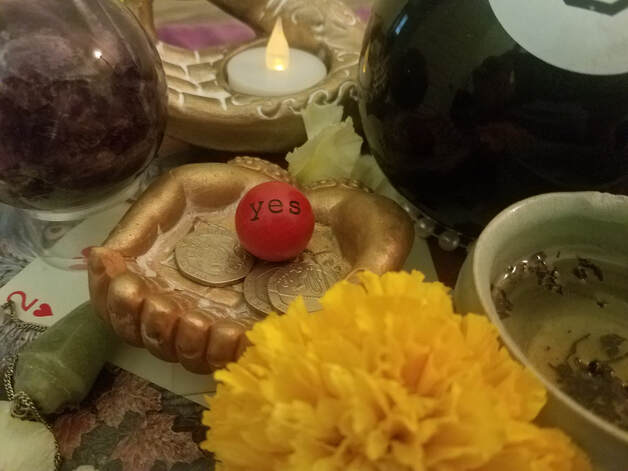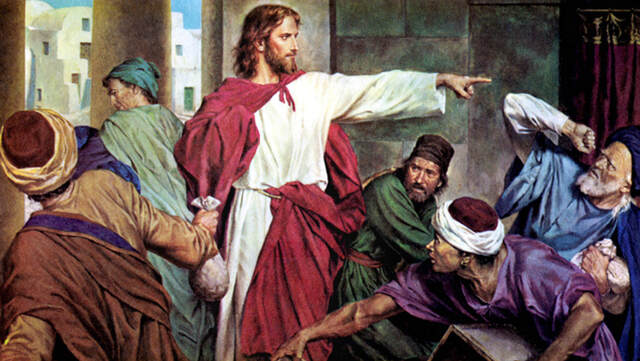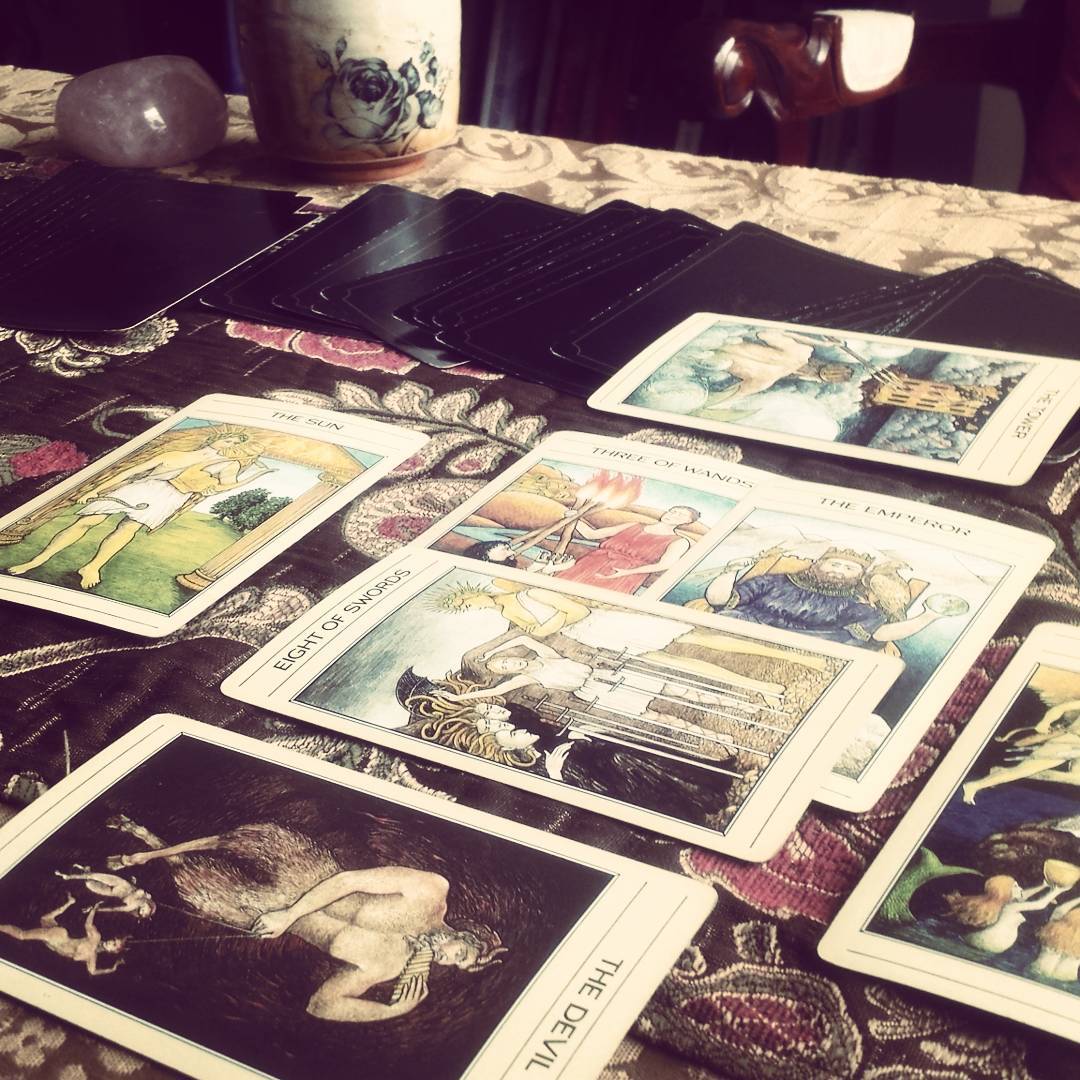|
It is hard to strike the right balance between what a client wants a reading to be about and what you know is helpful, good, and kind. So, it ushers a question: What is your philosophy of reading for others?
Do you feel that if the customer is paying then it is your job to supply them with whatever information they want? Do you feel that you have no right to determine what should be read for and what shouldn’t be? This is a fair stance. I mean, who the hell do we think we are, anyway? But, do you ever feel icky when you have read for someone and their question?
And whoo boy, don’t even get me started if it is a reading they don’t want to hear. It is so easy to ignore what comes through, or to even blame the reader. Only time will tell but often these people will rarely come back to let you know how spot-on the information was.
As a reader you have to hold to your ‘divinatory guns’ even while the person is shaking their head and telling you how absolutely wrong you are. This takes a tremendous amount of confidence and a very thick skin. As a business person, this can have real impact on your work especially so in this day and age of insta-rage reviews. You are front row and center of whatever reactions they will have if they are not getting what they want from you. No wonder readers have a high burn out rate. The emotional labor of our work (not even counting the act of reading but rather the interpersonal stuff) is daunting to say the least
One of the problems is that the larger cultural zeitgeist has reduced tarot to its most shallow constituent parts. This has a huge role to play in why there is a disconnect between what some people want readings to be and what readings actually are. The cultural shift is changing and I am so hopeful for that, but we have a long way to go.
But because of the disconnect, many people don’t know that tarot largely IS like a therapy session wherein there is the premise of healing, of breaking one’s delusions, and a realistic divinatory message that is based in real-time actions. You know, actions-consequences, even tarot cannot escape that. Perhaps these dismayed clients have avoided therapy because they don’t want to do the kind of introspective work it requires and just want to be told what to do and how everything will be ok. And some readers prey upon this. Bad readers like anxious clients because they are vulnerable and hurt people ripe for exploitation. These readers feel good to some clients because they are feeding the ego of the client while absolutely ignoring their spiritual and personal growth. Their false and crappy readings are junk food- they feel good in the moment but they offer nothing of sustenance and will actively harm the person over time. My personal experience has introduced me to countless clients who see those kinds of readers. These readers tell them that that abusive narcissist is their “soul mate” or “twin flame”. Invariably, these victimized people continue to open themselves to abuse because they have been led to believe that the Universe has preordained this terrible union. Blech. In my opinion, these kinds of predatory practices should see some jail time.
Sure, we are in control of the question-but how that is (or isn’t) answered is not up to us. Just because we demand to know in what month will Mr.Wrong will propose to us doesn’t mean that the Universe will answer back exactly in the way we expect. Huff! The hubris!
While we are attempting a connection with Spirit these messages are relayed via frail mortal people. These people have their own philosophies, emotions, and backgrounds. Some will read for any question without any issues. Some will say whatever it is that will make more money. And some want to use divination as a tool for self-improvement and spiritual growth. Trust me when I say that the third option is by far the hardest. I am not “Zoltan” don’t give me a coin while I spit out an inane fortune. I am a perceptive and intuitive reader who does this work because I truly believe in helping people get to their best selves. This is my mission. But I am also human-first and foremost I am that. So if a client wants me to read about the guy who left a year ago, was physically abusive and a compulsive liar, I won’t do it. I will not contribute to the reinforcement of the drama triangle. I refuse to be a co-conspirator to self-destruction. I would not be able to look at myself in the mirror in the morning if I did.
Within the intuitive industry I find that there are not enough conversations about how to navigate interpersonal quandaries. So often we are siloed alone in our homes or offices trying to navigate these things on our own. It is a very isolating career choice and there isn’t yet an international professional body that exists to support intuitive workers.
When up against difficult readings that sometimes have bad consequences for you as the reader, where do you go to normalize yourself? Where are you fed, bolstered, empowered and mentored? What kind of conversations are you having with yourself and others about the kind of reader you want to be?
3 Comments
Can that idea just die, please? There is an oft-repeated drumbeat in the tarot community that goes like this: “You shouldn’t charge for your gifts.” The reasoning behind this statement varies but it usually boils down to two arguments: The first is spiritual in nature. The idea is that if you have been given the spiritual gift of reading tarot, then you should not monetize it. Your tarot reading should be freely given because your spiritual ability has been freely given to you. The second argument usually has to do with accessibility. Many readers find it a hard square being caring healer with a pay wall. I am going to respond to both. The Spiritual Argument No one really knows where this whole ‘you shouldn’t charge for your gifts’ thing comes from. But I suspect that it has Judeo-Christian origins. Jesus walked into church one day and cast out the money changers. He made it clear that commerce and spiritual activity are kept separate. Most churches are free to attend and there is typically a legacy of charitable works for the poor. That being said, I don’t know any full time religious figure that doesn’t get paid. While nuns take a vow of poverty, they are also fed, clothed, have generous health insurance plans, and are taken care of in their retirement years. Same goes for Rabbis, Priests, Imans, and Buddist monks. By tithe, charity, food in a begging bowl, or by contributions all of these people who do spiritual work are paid. They should be paid. They should be taken care of as they care for others. To expect that a spiritual worker just labor for free seems like we don’t really want them to be taken care of in. The days of Manna falling from Heaven ended a long time ago. Lets talk about the “gifts” aspect of the argument. Say that you are an incredible psychic. You are able to find buried treasure and speak the name of future kings. But what makes you different than having the gift of mathematical ability, or the gift of a great literary mind? What if your gift is that you kick a ball really well? Do we not as a society pay people who have these varied talents? Then why would those who have an ephemeral ability be any different? Why do we shroud intuitive abilities behind a wall of superstition and rules that actually binds our hands from serving more people? Here is the fear: that if you do monetize your intuitive talents, then some force (you know the Force out there, somewhere) will take it away from you. Where does this superstition come from? I am not sure, but it is old. And it isn’t true. It is just another random old superstition that isn’t based on anything real, or even helpful. It is operating from a (usually) uninformed and un-examined belief that the Universe has some kind of score card wherein some abilities are ok to charge for, but not these. I ask you, why? Economic Argument The second argument usually comes from people who feel squeamish about charging money for their services. Often, they have a background in education or nursing where they were not experiencing the direct transaction of money for their efforts. They taught (or took blood pressure or whatever) people and those people were helped but almost mystically they saw a deposit in their bank account every two weeks. They often have a disconnect with the economic machine underpinning all of that to make it happen. Let me just add that I know that person well, because I was once that person. This lovely person who decides to build a tarot business feels at odds with charging people directly. The guilt is usually tied to underlying and often un-examined feelings around money, access and privilege. They assuage that guilt by creating systems such as sliding scale payments, or charging so low that they cannot support themselves with the work. They don’t want to “read for rich people.” They want to be a friend and helper to all. This sentiment does not square well, however, if you are trying to become a full time reader so it boils down to this essential question: Do you want your readings to financially support you, or do you want your readings to be charitable contributions? Of course there are shades of nuance here but this is essentially a philosophical reflection. It is challenging to hold both arguments and make them work. Here is why: As a self-employed person I have to ensure that each reading is priced so that I am able to pay my bills, my health insurance and my retirement contributions in addition to the business expenses that go into running a business. Oh, also I pay twice the amount of taxes, yay self-employment! While I may only be paid for the actual hour I am reading, it has to be enough to cover all the other things that I am doing to keep the business afloat (writing this article, bookkeeping, emails, newsletters, class creation and so on). This is a different economic standpoint and often one not understood by people in muggle (your standard wage earning) jobs. The economics of direct service self-employment looks nothing like a salary or even an hourly wage earners. So every month I need a minimum amount to keep my business and my life afloat. But also, (caveat here-every reader is different) I have a finite number of reading sessions in me each week. Once I cross over that number my accuracy, compassion, and insightfulness begin to tank. I do not want to give bad readings because I am exhausted so I have to throttle the amount of readings I can do. Therefore, it is a dance between what I am physically capable of, what I need to live, and business costs. These calculations directly inform what I charge in an hour and also how many hours I will schedule in a week. If I add sliding scale payments that essentially means that I will make wealthier people pay a higher amount to cover the lower cost of the person who cannot. Or, I have to read for more hours to make up for discounted sessions. Honestly, I do not feel comfortable being the person who makes that economic determination for others. I do not want to politicize my work in this way. Because I only have a finite amount of readings in a week I need all of them to pay my bills. But charitable contributions I do give. I give financially monthly to nonprofits that do work that I believe in. I volunteer for a local wildlife rehabilitation center and I also volunteer weekly for Meals of Wheels. I volunteer in ways that allow me to give back, don’t contribute to reader burn-out, and as a bonus, I gain new perspectives because I am giving in different ways. I am only able to give like this because of the career I have. Just like anyone else who has a muggle job and volunteers in their spare time. I think there is no real direct correlation between your special aptitudes and those being the aptitudes you need to give away. In fact, the time you spend volunteering by using skill sets in other areas will only enhance what you have monetized. I am a better reader when I spend some time outside of the tarot booth doing other things that feed my heart and help others. There is more than one way to give. In conclusion, I think it is such a beautiful sentiment in the tarot and intuitive communities that so many struggle with the idea of monetizing their time and capabilities. We are labeled as flim-flam con artists and people of the worse repute when in actuality, most of us want to give and be of service. I think this is the right problem to have because it speaks to an underlying ethical and moral code that is needed in this world. But, I also think there are ways to examine how we want to read, who we want to read for, and whether we actually want to make a living doing it. Hey, still here? Cool! You might be interested in this:
Every week I send out Fortune Friday, yes this is a totally free and totally rad weekly personal fortune. I switch it up, too. Some weeks its tarot, others are I-Ching and some are even silly and fun like the Magic 8 Ball. Get yours inboxed every Friday. Thanks for reading! Which one of these statements do you agree with? Women are bad drivers. Teenagers are lazy. Tarot card readers are con artists. Wide sweeping statements feel so definitive that it is easy to believe them. Black and white thinking feels so much more comfortable than grey. It feels good to pronounce a belief about a whole group of people believing that our judgement is right. Stereotyping is based out of a need to categorize, condemn, and ultimately feel better than the people we may be talking about. Have I personally watched every single woman drive, and do I have the certifications necessary to make that kind of judgement call? While some teens might be slow in the motivation department, there are many examples of the opposite. However, I hear the third statement regularly and without question that it is indeed, true: “Tarot readers are all con artists.” Rational, objective, science-minded folks eat up the social consensus regarding tarot. Logical and fair-minded people regularly denounce a whole field without ever having visited a reader. What is the first premise in scientific inquiry? Observation. Have these people suddenly forgotten the very foundation of their beliefs in the rush to denounce what they might not know anything about? How can this be? How is it that while we are quick to denounce stereotypes we are able to make the exception with tarot readers? It is, I suspect, due to tarot’s public image coupled with an incorrect assumption promulgated by popular culture and the co-opting of tarot by people with questionable ethics. Tarot is not the problem. Shitty people using tarot are the problem. Google up any image of a tarot reader in the movies or TV shows and more often than not we are treated to a mysterious, dark-haired woman. This woman is of indeterminate background (an inelegent nod to the idea that ‘they are foreign’) is sitting in a darkly lit room, ready to receive a questioner. She pronounces the fate of said character for good or ill. This fate is unalterable and our tarot reader has the ability to see into that future that is already written out for us. A search for the words ‘tarot reader’ also reveals con artists who use tarot to prey upon the innocent. One need not look far to read stories about a certain actress in a fake Jamaican accent imploring you to call now. Not far behind her are so-called tarot readers who were jailed after husting tens of thousands of dollars from the wealthy or the desperate. Finally, the bias towards tarot are often from people who question the very nature of tarot and what it does. They believe that tarot does not work, and anyone who believes in it is either gullible or a con artist (see that “all, never, or always” thinking here)? But the thing is is that the underlying assumptions about how tarot works are inaccurate. That assumption was unquestionably formed by some real bad actors (pun intended). So how can we form a truly informed opinion if we are working off of assumptions that are patently false or misunderstood? We can’t. It is easy to assume that our underlying beliefs that form the basis of our opinions are accurate. But that it is not scientific inquiry. Rather, that is bias. Bias is often the byproduct of a closed mind who frankly stopped thinking the moment their irrational criticism began to rear it’s head. It is this bias that hounds professional, honest, and earnest readers. In short, we are a field green-lighted for condemnation. This condemnation is largely based on a complete fantasy regarding what we do and how we do it. Have people completely given up on the banking system because of the Great Recession? Are lawyers ran out of town with crowds of people holding pitchforks? Of course not. Because we know that while there are some unscrupulous bankers and lawyers, we also know that not all of them are. And while someone might not understand how tarot works, that lack of understanding does not mean that tarot readers are selling snake oil. Tarot is having a moment. Tarot is being normalised by a generation of people who are willing to dive into the mystery of personal truths. More than ever, there are professionals in this field who take the work of reading very seriously and treat their craft with the professionalism it deserves. Tarot is not going anywhere, and just like massage and acupuncture and herbalism, it is moving towards a stable norm. While tarot has a PR problem now, I see the shift on the horizon. I look forward to the day where I can say I am a professional reader without cringing or avoiding the question because I don’t want to deal with some people’s bias. I cannot wait to be open and comfortable with this passion of mine and my work in the way it deserves. |
Details
Subscribe below to get my daily blog posts right in your email!
Jenna Matlin
M.S. in Organizational Psychology and Leadership Categories
All
|






 RSS Feed
RSS Feed
